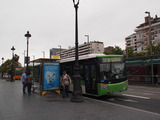
Watch the video clips, waiting for a bus in Spain, and answer the questions using complete Spanish sentences.Photo: CC-BY-NC-ND deming131
- Subject:
- Languages
- World Cultures
- Material Type:
- Lesson Plan
- Author:
- Lindsey Fairbanks
- Date Added:
- 08/29/2018

Watch the video clips, waiting for a bus in Spain, and answer the questions using complete Spanish sentences.Photo: CC-BY-NC-ND deming131

This subject offers a broad survey of texts (both literary and philosophical) drawn from the Western tradition and selected to trace the growth of ideas about nature and the natural environment of mankind. The term nature in this context has to do with the varying ways in which the physical world has been conceived as the habitation of mankind, a source of imperatives for the collective organization and conduct of human life. In this sense, nature is less the object of complex scientific investigation than the object of individual experience and direct observation. Using the term "nature" in this sense, we can say that modern reference to "the environment" owes much to three ideas about the relation of mankind to nature. In the first of these, which harks back to ancient medical theories and notions about weather, geographical nature was seen as a neutral agency affecting or transforming agent of mankind's character and institutions. In the second, which derives from religious and classical sources in the Western tradition, the earth was designed as a fit environment for mankind or, at the least, as adequately suited for its abode, and civic or political life was taken to be consonant with the natural world. In the third, which also makes its appearance in the ancient world but becomes important only much later, nature and mankind are regarded as antagonists, and one must conquer the other or be subjugated by it.
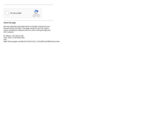
Technical writing courses introduce you to some of the most important aspects of writing in the worlds of science, technology, and business—in other words, the kind of writing that scientists, nurses, doctors, computer specialists, government officials, engineers, and other professionals do as a part of their regular work. The skills learned in technical writing courses can be useful in other fields as well, including education and social sciences.
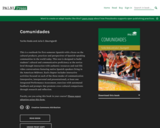
This is a textbook for first-semester Spanish with a focus on the cultural products, practices and perspectives of Spanish-speaking communities in the world today. This text is designed to build students’ cultural and communicative proficiency at the novice level through interaction with authentic resources and real-life video conversations featuring native Spanish speakers living in the American Midwest. Each chapter includes interactive activities focused on each of the three modes of communication (interpretive, interpersonal and presentational), at least one Integrated Performance Assessment, exercises with automated feedback and prompts that promote cross-cultural comparisons through research and reflection.
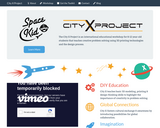
The City X Project is an international educational workshop for 8-12 year-old students that teaches creative problem solving using 3D printing technologies and the design process. This 6-10 hour workshop is designed for 3rd-6th grade classrooms but can be adapted to fit a variety of environments. Read a full overview of the experience here: http://www.cityxproject.com/workshop/
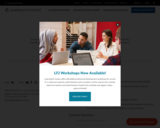
In this lesson, students explore the varied work of scientists, technologists, engineers and mathematicians, and discuss character traits common to all of them. Students meet a diverse group of scientists—inventors, problem-solvers and those who explain the world around us.
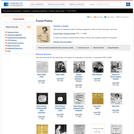
A selection of Library of Congress primary sources exploring found poetry and the ability to retell history from one's own perspective. This set also includes a Teacher's Guide with historical context and teaching suggestions.

Driving my English correctly to drive my carSummary:This is a lesson intended for learners having low conversational English skills as well as low reading and writing skills. In this lesson, the learners will review known vocabulary as well as learn new one using it with a correct grammatical structure. They will practice reading and writing. The learners will learn how to read, write and speak in order to communicate with others using correctly la grammar functions; All this will be taught in a real world-problem context.Educational useCurriculum /instruction College & Career Readiness Standards (CCRS) Alignment • Level: Adult Education • Grade Level: B • Subject: English/Language Arts • Strand: Reading and Writing LanguageEnglish Learning goals:The purpose of this lesson is for learners to be able to:· Learn the correct use of present tense in verbal communication· Read and write correctly personal information· Understand basic driving instructional information. Keywords Designers for learningAdult educationDriving licensePresent tenseDriving directionsEnglish lesson to drive a car Time required for the lesson45 to 60 minutes Prior knowledgeBasic English vocabulary to introduce oneselfAbility to understand mains ideas in short conversationAbility to read and write basic English vocabulary to introduce oneself Required resourcesWorksheetsIllustrationsDriving guide Lesson author & LicenseLesson author: Zulema RamirezLicense: Creative Commons CC BY 4.0 license Context summary Learning a new language is certainly a challenge, mostly if we cannot attend to school regularly, As a consequence, being forced to communicate, we learn words and phrases informally, not knowing how to put them together effectively to express our ideas into this new language. In this lesson, we are going to walk the learners through the correct lexical and grammatical use of her/his prior knowledge in the present tense and at the same time we are going to integrate new content related to a short - term goal: Obtaining a driver license. Targeted skills Presence tenseDriving vocabularyAsking and giving directions formal phrasesDescribe family members. Learning objectivesBy the end of the lesson, the learner should be able to:1 Give personal information using grammatically correct professional English.2. Read and write driving directions.3. Ask directions using formal English phrases4. Follow directions given by the driving instructor Relevant for learning Adult learners planning to complete a professional instruction need to master the required English skills level. This lesson will be focused on the use of the present tense, having as subject daily activities and driving instructions. This lesson will allow the learner to refresh previous lexical knowledge and to learn the correct grammatical use of present tense. The learner will also practice writing and reading. This practice gives the learner the opportunity to improve his/her English skills. Warm up The teacher will provide the learners an application form to fill out. When filling in the form the learners will be induced to bring out tacit knowledge, like reading personal information questions, writing her/his address. The form could also include personal development questions in order to prompt the learners to give the teacher more information about their daily activities as well as her English level. Once this activity is done, the teacher will use the form’s questions to prompt the learners to introduce herself/himself. IntroductionThe teacher explains the course of the instruction for this lesson Presentation/modeling/demonstration The teacher will introduce herself / himself using new vocabulary in order to complete grammatically correct longer sentences Using a map of the city, the teacher will show the learn a location to explain her way to school. Here the teacher could use driving directions giving detail on how to get to school form the location she/ he chooses. .The teacher could explain succinctly why having a driver license is important her. The teacher could present all these information in a worksheet form. It could be used to underline verbs in present tense so the learners could have it as a reference for their own presentation. Application After finishing the demonstration phase, the teacher will ask question utilizing the application form filled out previously and the teacher’s demonstration in order to let the learners practice. In this way the learner will be exercising reading while combining known and new vocabulary to use it in present tense properly.Integration In this phase the learner is going to reproduce a real world situation like giving/ asking personal information, asking address, identifying driving directions, writing down driving directions. During the activities the learners will integrate all aspects studied in this lesson using formal English.

How do literature, philosophy, film and other arts respond to the profound changes in world view and lifestyle that mark the twentieth century? This course considers a broad range of works from different countries, different media, and different genres, in exploring the transition to a decentered "Einsteinian" universe.
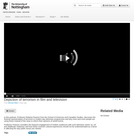
In this podcast, Professor Roberta Pearson from the School of American and Canadian Studies, discusses the fictional representation of terrorism in modern day television programmes and why more and more people are using fiction instead of the news to inform their opinions of world events.
Professor Pearson considers the frequent engagement of modern audiences with such television series’ as ‘24’ and ‘Battlestar Galactica’ and how these common cultural experiences should not be underestimated as a factor in affecting the way public issues are viewed.
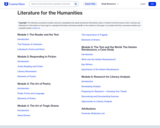
Literature in the Humanities is an introduction to the study of the characteristics, conventions, and socio-historical contexts of the major literary forms, including the analysis and interpretation of literary elements and devices, and the application of literary theory and criticism. This course is designed to encourage a deep appreciation of literature, hone critical thinking skills, and to illustrate the importance of literature as an expression of the human cultural experience.
LIT2000, as well as all Humanities General Education courses, approaches the concept of culture as a system of meanings allowing groups and individuals to give significance to the world and mediate their relationships with each other and their known universe. Humanities courses are distinguished from traditional Liberal Arts disciplines through an emphasis on interdisciplinarity and comparative cultural contexts. Through these approaches to cultural texts and artifacts, the humanities attempt to investigate, contest, analyze, and synthesize the phenomena of human agency and subjectivity both within and between cultures. By pursuing these forms of inquiry we may better understand our world and our places within it. 1
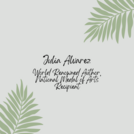
Julia Alvarez was born in 1950 in NYC. Shortly after her birth, she and her parents returned to their home country, the Dominican Republic (Chicago Public Library, 2004). 10 years later, Julia Alvarez along with her family was forced to flee to the United States because of her father’s involvement in trying to plan to overthrow the dictator, Trujillo (Chicago Public Library, 2004).
Julia found it difficult to fit into her new life in the United States and she found it challenging to learn the English language. Julia experience alienation from her peers and prejudice because she was an immigrant (Chicago Public Library, 2004).
Julia said, “I consider this radical uprooting from my culture, my native language, my country, the reason I began writing” (Alvarez, 2020).
Alvarez earned her undergraduate degree from Middlebury College in 1971 and a master’s degree in creative writing from Syracuse University in 1975 (Chicago Public Library, 2004).
Julia Alvarez has published many books in her career as a writer; many in both English and Spanish. How the Garcia Girls Lost Their Accents was published in 1991 as Julia’s first novel. It told the story of four immigrant sisters from the Dominican Republic adjusting to life in the United States. It was the first novel written by someone from the Dominican Republic in the English language. How the Garcia Girls Lost Their Accents was the winner of the 1991 PEN Oakland/Josephine Miles Literary Award for works that present a multicultural viewpoint (Lit Lovers, 2022).
Another wonderful book, published in 1994, Time of Butterflies, told the story of the brave women who did not survive the dictatorship. It was a finalist in 1995 for the National Book Critics Circle Award, was a notable book by the American Library Association in 1994, and was chosen as one of the Best Books for Young Adults by the Young Adult Library Services Association and the American Library Association in 1995 (Chicago Public Library, 2004).
In preparing for this video, I read the book Where Do They Go? It is a book for children that explains the death of a loved one. The children want to know where did their loved ones go and through wonderful poetic words and illustrations, a soft answer is given to the children in a way they can understand (Julia Alvarez, 2016).
In addition to writing award-winning books, Julia Alvarez has earned the Pura Belpre and Americas Awards for her young adult books, the Hispanic Heritage Award, and the F. Scott Fitgerald Award. At a ceremony in 2014, Julia received the National Medal of Arts from President Obama (National Endowment for the Arts, 2013).
Julia Alvarez is a wonderful storyteller and author because she writes from her own experiences as an immigrant and embraces multicultural identity. She authors books for children, young adults, and adults. Julia Alvarez writes with poetic words and teaches tolerance of immigrants. Her stories feature characters who have had to show strength when met with alienation, prejudice, adversity, and oppression. She knows how difficult it can be to navigate between two identities; two cultures; She shows how difficult it was for her and for many others how to learn a new way of life and hang on to one’s own culture. She does all of this with poetic words in beautiful stories. Julia Alvarez’s stories are important for people of all ages to read to grow empathy for people of other cultures.
Julia Alvarez is a writer-in-residence at Middlebury College (National Endowment for the Arts, 2013).
Julia Alvarez and her husband founded an organic coffee farm promoting sustainability by using sustainable methods in the Dominican Highlands as a tribute to the women who were killed during the dictatorship. The profits from this farm go to the Alta Garcia Foundation, which promotes literacy programs for the local population (The Mariposa Dr. Foundation, 2021).

Students will examine ways declining bee population can impact day-to-day life, by considering how the cost of honey and pollination has been affected in society. Students will create real-world problems that relate to statistics on the declining bee population.
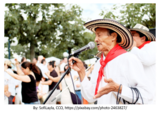
The word "pop-culture" refers to contemporary people, events, or things of the current times. In this seminar you will learn about pop-culture Spanish-speakers who you may have known were Spanish-speakers or came from Latino backgrounds, while some of them may be a complete surprise to you. Learn more about these people and you will come to realize how many Spanish-speakers there are in your world and how they affect your daily life in music, movies, television, and sports.ACTFL StandardsCultures: Relating Cultural Products to PerspectivesComparisons: Cultural ComparisonsCommunities: Lifelong LearningLearning TargetI can give a presentation about a famous athlete, celebrity, or historical figure.Habits of MindCreating, imagining, innovatingCritical Thinking SkillConstruct Meaning

This course analyzes major modern plays featuring works by Shaw, Pirandello, Beckett, Brecht, Williams, Soyinka, Hwang, Churchill, Wilson, Frayn, Stoppard, Deveare Smith, and Kushner. The class particularly considers performance, sociopolitical and aesthetic contexts, and the role of theater in the world of modern multimedia.

In this engaging unit, students will design and plant a square-foot garden that will be their central tool. Through the growing season, they will explore nutrition content in their everyday lives and see how it relates to what they are growing.

In the decades following the Second World War, a cluster of extraordinary French thinkers were widely translated and read in American universities. Their works were soon labeled as "French Theory." Why would sharing the same nationality make authors such as Lacan, Cixous, Derrida, Foucault or Debord, ambassadors of a specifically "French" theory? The course will explore the maze of transatlantic intellectual debates since 1945 and the heyday of French existentialism. We will study the debates on communism, decolonization, neo‐liberalism, gender, youth culture and mass media. This course is taught in English.
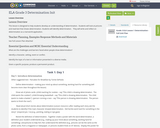
Lesson OverviewThis lesson is designed to help students develop an understanding of determination. Students will look at pictures and read text that shows determination. Students will identify determination. They will write and reflect on determination as a real world application.Teacher Planning, Examples Response Methods and MaterialsSee Full Lesson Plan AttachedEssential Question and NCSC Essential UnderstandingWhat are the challenges and barriers faced when people show determination?Identify a character, setting, event or conflict.Identify the topic of a text or information presented in a diverse media.Given a specific purpose, produce a permanent product.

In Communicating in American Culture(s), bilingual students examine how various aspects of American culture—history, geography, institutions, traditions, values—have shaped dominant Anglo-American communication norms and responses to critical events in the world. In addition, you can expect to practice and strengthen your analytical and communication skills in a carefully scaffolded manner, starting with frequent short writing and speaking tasks and progressing to longer, more formal tasks.

This seminar is about the pleasures and power of reading. From the Sumerian clay tablets of more than four millenia ago through the spectacular emergence of the electronic text, the written word—in all its forms—has captivated the human mind, embodied our insights into the world around us, and made enduring our most profound artistic creations and scientific discoveries.